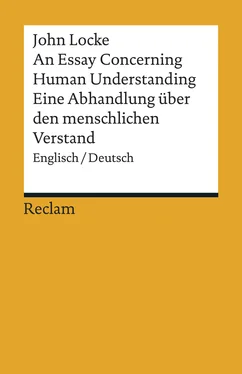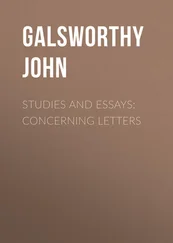[…]
§ 32. […] which ever of these complex Ideas be clearest, that of Body, or immaterial Spirit, this is evident, that the simple Ideas that make them up, are no other than what we have received from Sensation or Reflection; and so is it of all our other Ideas of Substances, even of God himself.
[…]
§ 35. For it is Infinity, which joined to our Ideas of Existence, Power, Knowledge, etc . makes that complex Idea , whereby we represent to our selves the best we can, the supreme Being. For though in his own Essence, (which certainly we do not know, not knowing the real Essence of a Peble, or a Fly, or of our own selves,) God be simple and uncompounded; yet, I think, I may say we have no other Idea of him, but a complex one of Existence, Knowledge, Power, Happiness, etc . infinite and eternal: which are all distinct Ideas , and some of them being relative, are again compounded of others […].
[…]
Of Collective Ideas of Substances
§ 1. BESIDES these complex Ideas of several single Substances, as of Man, Horse, Gold, Violet, Apple, etc . the Mind hath also complex collective Ideas of Substances; which I so call, because such Ideas are made up of many particular Substances considered together, as united into one Idea , and which so joined, are looked on as one; v. g . the Idea of such a collection of Men as make an Army, though consisting of a great number of distinct Substances, is as much one Idea , as the Idea of a Man: And the great collective Idea of all Bodies whatsoever signified by the name World, is as much one Idea , as the Idea of any the least Particle of Matter in it; it sufficing, to the unity of any Idea , that it be considered as one Representation, or Picture, though made up of never so many Particulars.
[…]
Of Relation
§ 1. BESIDES the Ideas , whether simple or complex, that the Mind has of Things, as they are in themselves, there are others it gets from their comparison one with another. The Understanding, in the consideration of any thing, is not confined to that precise Object: It can carry any Idea , as it were, beyond it self, or, at least, look beyond it, to see how it stands in [304]conformity to any other. When the Mind so considers one thing, that it does, as it were, bring it to, and set it by another, and carry its view from one to t’other: This is, as the Words import, Relation and Respect ; and the Denominations given to positive Things, intimating that Respect, and serving as Marks to lead the Thoughts beyond the Subject it self denominated, to something distinct from it, are what we call Relatives ; and the Things so brought together, Related . […]
§ 2. […] Relations , expressed by relative terms , that have others answering them , with a reciprocal intimation , as Father, and Son; Bigger, and Less; Cause, and Effect, are very obvious to every one, and every Body, at first sight, perceives the Relation. […] But where Languages have failed to give correlative Names, there the Relation is not always so easily taken notice of. Concubine is no doubt, a relative Name, as well as Wife: But in Languages where this, and the like Words, have not a correlative term, there People are not so apt to take them to be so, […] Hence it is, that many of those Names, which duly considered, do include evident Relations, have been called External Denominations. […]
§ 3. Another sort of relative terms there is, which are not looked on to be either relative, or so much as external Denominations: which yet, under the form and appearance of signifying some thing absolute in the Subject do conceal a tacit, though less observable, Relation. Such are the seemingly positive terms of Old , Great , Imperfect , etc. whereof I shall have occasion to speak more at large in the following Chapters.
[306][…]
§ 7. Concerning Relation in general, these things may be considered:
First , That there is no one thing , whether simple Idea , Substance, Mode, or Relation, or Name of either of them, which is not capable of almost an infinite number of Considerations, in reference to other things: and therefore this makes no small part of Men’s Thoughts and Words. […]
§ 8. Secondly , This farther may be considered concerning Relation , That though it be not contained in the real existence of Things, but something extraneous, and superinduced: yet the Ideas which relative Words stand for, are often clearer, and more distinct, than of those Substances to which they do belong. The Notion we have of a Father, or Brother, is a great deal clearer, and more distinct, than that we have of a Man: Or, if you will, Paternity is a thing whereof ’tis easier to have a clear Idea , than of Humanity […].
§ 9. Thirdly , Though there be a great number of Considerations, wherein Things may be compared one with another, and so a multitude of Relations : yet they all terminate in , and are concerned about, those simple Ideas, either of Sensation or Reflection […]. To clear this, I shall shew it in the most considerable Relations, that we have any notion of; and in some that seem to be the most remote from Sense or Reflection […].
§ 10. Fourthly , That Relation being the considering of one thing with another, which is extrinsical to it, it is evident, that all Words, that necessarily lead the Mind to any other Ideas , than are supposed really to exist in that thing, to which the [308]Word is applied, are relative Words . v. g . […] Father , Brother , King , Husband , Blacker , Merrier , etc . are Words, which, together with the thing they denominate, imply also something else separate, and exterior to the existence of that thing.
[…]
Of Cause and Effect, and other Relations
§ 1. IN the notice, that our Senses take of the constant Vicissitude of Things, we cannot but observe, that several particular, both Qualities, and Substances, begin to exist; and that they receive this their Existence, from the due Application and Operation of some other Being. From this Observation, we get our Ideas of Cause and Effect . That which produces any simple or complex Idea , we denote by the general name Cause ; and that which is produced, Effect . […]
§ 2. Having thus, from what our Senses are able to discover, in the Operations of Bodies on one another, got the Notion of Cause and Effect ; viz . That a Cause is that which makes any other thing, either simple Idea , Substance, or Mode, begin to be; and an Effect is that, which had its Beginning from some other thing. The Mind finds no great difficulty, to distinguish the several Originals of things into two sorts.
First , when the thing is wholly made new, so that no part thereof did ever exist before; as when a new Particle of Matter doth begin to exist, in rerum natura , which had before no Being, and this we call Creation .
[310] Secondly , When a thing is made up of Particles, which did all of them before exist, but that very thing, so constituted of pre-existing Particles, which considered altogether make up such a Collection of simple Ideas , had not any Existence before, as this Man, this Egg, Rose, or Cherry, etc . And this, when referred to a Substance, produced in the ordinary course of Nature, by internal Principle, but set on work by, and received from some external Agent, or Cause, and working by insensible ways, which we perceive not, we call Generation ; when the Cause is extrinsical, and the Effect produced by a sensible Separation, or juxta Position of discernible Parts, we call it Making; and such are all artificial things. When any simple Idea is produced, which was not in that Subject before, we call it Alteration . Thus a Man is generated, a Picture made, and either of them altered, when any new sensible Quality, or simple Idea , is produced in either of them, which was not there before […].
Читать дальше












